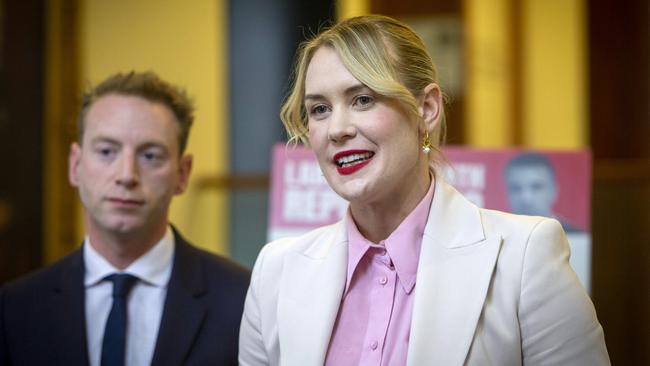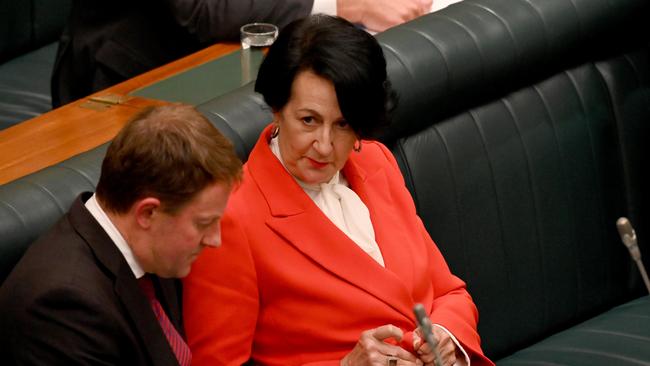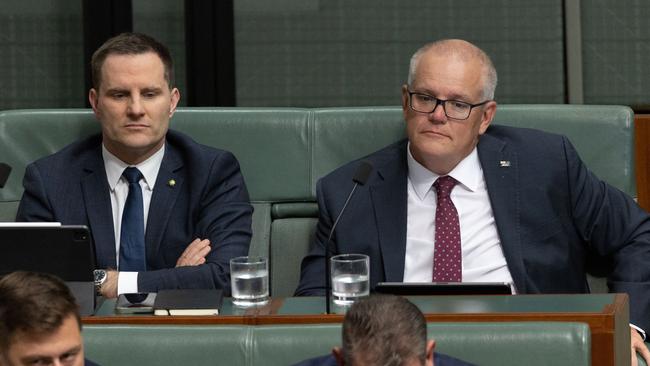Scott Morrison provides a stark reminder of the cost of Liberal idealism | David Penberthy
David Speirs found out the hard way what happens when you tell a Liberal branch to elect a female candidate, writes David Penberthy.
Opinion
Don't miss out on the headlines from Opinion. Followed categories will be added to My News.
Perhaps they stand out more because there have been relatively few of them.
In my 30 years covering South Australian politics for this newspaper, it is the female MPs who have often struck me as the most impressive in the effort and application they have brought to the role.
I have met a lot of decent and hardworking male MPs in that time.
I have also met a fair few bludgers for whom frequent long lunches on taxpayer and the odd bombastic parliamentary speech was pretty much the sum total of their contribution.
No female MP fits into that category. The booziness and bravado was the sole preserve of the blokes.
Thinking back too, many of these women worked in near-complete isolation from any fellow members of their gender, and often had a unique way of approaching issues which was of benefit to their party.
The first person in SA to raise questions about the finances of the State Bank in the early 1990s was the Liberal MP Jennifer Cashmore.
Cashmore served as minister for health and also tourism in David Tonkin’s Liberal government, but it was her pursuit of the bank that was arguably her most important legacy.
She became convinced that something was awry and started demanding answers at a time when many of her Liberal colleagues believed the party should ignore the issue for fear of talking down the state’s economy, even though the economy was about to be clobbered anyway on account of the bank’s impending collapse.

Susan Lenehan was a Labor education minister. I got to know her as education reporter for this newspaper when I had just finished my cadetship. She was a good local member and a passionate advocate for public education, and would have prospered in politics if not for getting snared in the 1993 State Bank election landslide, when even the people of Christies Beach voted en masse for the Liberal Party.
Di Laidlaw was transport minister in the Brown government and brought an easy charm to her industrial dealings with the likeable but crotchety John Crossing, who headed up the Public Transport Union.
Laidlaw also brought us a great piece of infrastructure which was long overdue in Adelaide’s south, the Southern Expressway. She was ridiculed for the fact that it only went one way, changing directions mid-arvo, and on weekends.
The economic realities were that having lost more than $3bn with the demise of the aforementioned bank, and in the absence of a toll road, a half-sized freeway was all the state could afford, and still a major improvement on the road infrastructure southern residents had been using prior.
Vickie Chapman might have been a polarising figure within the Liberal Party, but she achieved two key firsts – first female Attorney-General and first female deputy premier – in a state which is now alone in the Commonwealth in never having been led by a female premier.

As things currently stand, with Peter Malinauskas in the ascendancy and the Liberals licking their wounds with just two female MPs in their lower house team, the prospect of a female SA premier looks distant.
Why does any of this matter?
It matters because, these days, there is a growing recognition – and among women a demand – that the parliament must reflect the community it serves.
And that means a parliament that has plenty of women in it. Not the parliaments of yesteryear referenced above, where a Di Laidlaw or Susan Lenehan was a novelty on the frontbench, and the backbench was heavy with long-lunching male time servers.
The SA Liberals this week released their response to the women’s working group on the question of increasing female representation.
The headline points are to preselect women for 50 per cent of all seats at the next election, and to achieve 50 per cent female representation within three terms of government. That is by 2034.
The party hopes to achieve these things without an affirmative action rule.
I can understand the Liberal’s philosophical quandary over adopting a hard gender target. The entire DNA of the party is framed around reward based on merit.
There are many women in the Liberals who regard quotas as patronising. Further, the party is ruled from the ground up, not the top down.
As Opposition Leader David Speirs has found at his peril, the worst way to ensure a local branch backs a female candidate is to ask them to do so, as they will baulk at the idea as a matter of general principle at the imposition of external authority.

There remains a key problem with this position. Historically, a lot of blokes have been preselected not because they’re the best, but because they’re mates with the right people and have stitched up the numbers.
Boy’s clubs don’t have a history of sacking themselves. The reason Labor women set up Emily’s List under the leadership of former Victorian premier Joan Kirner was to take a more in-your-face approach to wresting winnable seats out of male factional control.
Labor was meandering along on female representation until it adopted targets because the men who stood to lose weren’t going quietly into the night.
The idea that the Liberals can achieve any of this without a hard target might fit with the party’s ethos. But if these targets are met organically, it will be nothing short of a miracle, one without any precedent I can find.
The final point too – if you’re a conservative, you need to look at this issue dispassionately. As pure as your commitment might be to the idea of reward for merit, there’s one bloke who is currently doing not much work-wise as a result of alienating the women of Australia. His name is Scott Morrison.
The idea that you can sail through this stuff without consequence is a dangerous fallacy for any political party these days.





